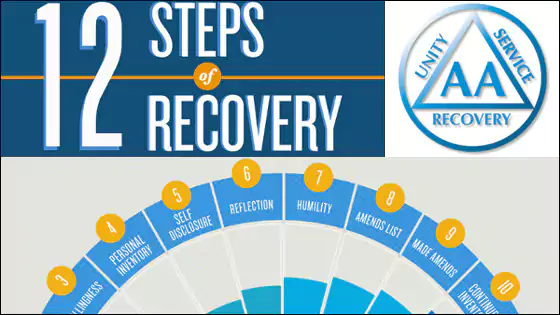
The Twelve Steps of AA
A twelve step program is a set of guiding principles outlining a course of action for recovery from addiction, compulsion, or other behavioral problems. Originally proposed by Alcoholics Anonymous (AA) as a method of recovery from alcoholism, the Twelve Steps were first published in the 1939 Alcoholics Anonymous Book: The Story of How More Than One Hundred Men Have Recovered from Alcoholism. The method was adapted and became the foundation of other twelve-step programs.
The heart of the suggested program of personal recovery is contained in Twelve Steps describing the experience of the earliest members of the Society:
- We admitted we were powerless over alcohol – that our lives had become unmanageable.
- Came to believe that a Power greater than ourselves could restore us to sanity.
- Made a decision to turn our will and our lives over to the care of God as we understood Him.
- Made a searching and fearless moral inventory of ourselves.
- Admitted to God, to ourselves and to another human being the exact nature of our wrongs.
- Were entirely ready to have God remove all these defects of character.
- Humbly asked Him to remove our shortcomings.
- Made a list of all persons we had harmed, and became willing to make amends to them all.
- Made direct amends to such people wherever possible, except when to do so would injure them or others.
- Continued to take personal inventory and when we were wrong promptly admitted it.
- Sought through prayer and meditation to improve our conscious contact with God as we understood Him, praying only for knowledge of His will for us and the power to carry that out.
- Having had a spiritual awakening as the result of these steps, we tried to carry this message to alcoholics and to practice these principles in all our affairs.
Newcomers are not asked to accept or follow these Twelve Steps in their entirety if they feel unwilling or unable to do so.
They will usually be asked to keep an open mind, to attend meetings at which recovered alcoholics describe their personal experiences in achieving sobriety, and to read AA literature describing and interpreting the AA program.
AA members will usually emphasize to newcomers that only problem drinkers themselves, individually, can determine whether or not they are in fact alcoholics.
At the same time, it will be pointed out that all available medical testimony indicates that alcoholism is a progressive illness, that it cannot be cured in the ordinary sense of the term, but that it can be arrested through total abstinence from alcohol in any form.